Siberian Huskies are beautiful dogs. They look like wolves, and have thick, soft coats, that make them infinitely cuddly. They have piercing eyes, and wonderful masks, that give them a roguish and unique look.
Siberians can make very good family pets. If properly trained, they can be very good with people, children, and other dogs. Indeed, Sibes are commonly known for their friendliness toward people.

Although they may look like fierce wolves, they have the heart of Casanova. All my Huskies want to do, is greet everyone and give them licks.
However, many people have trouble with this breed, and many Sibes get surrendered every year.
Consider these Siberian Husky facts, before going out and getting a puppy. The Siberian Husky is a very special and lovable breed, but they may not be the right breed for everyone.
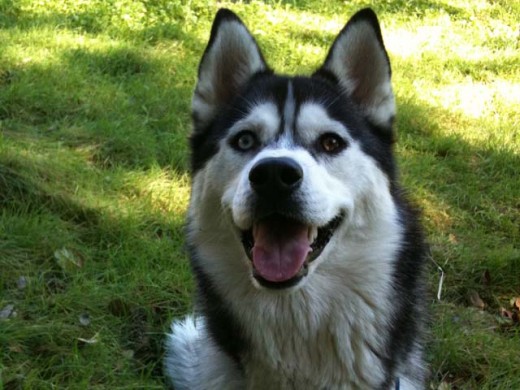
1. Siberian Huskies Shed a Lot!
Be ready to have dog hair all over the house – floors, carpets, clothing, furniture, everywhere.
If we are allergic to dog hair, or like our home to be very clean, then the Siberian Husky is not for us.
When I was looking for a Sibe, I talked to a few breeders in my area. The first thing they all said was, “Siberians shed a lot”. I mentioned that my other dog, a Shiba Inu, also has a double coat, and also sheds a fair amount. However, they all said, “Siberians shed a lot more”.


And they do! A whole lot more.
Therefore, it is very important to train our Husky puppy to enjoy the grooming experience.
- I start with a soft brush, and lightly comb my dog’s body for a short period of time.
- I do this often, and pair it with food rewards.
- Once my puppy is comfortable with the brushing process, I very slowly extend the length of our grooming session.
- Finally, I repeat the process with a more solid brush, such as the Furminator.
Frequent brushing is a good idea to keep our Husky clean, and clear out loose hair. The more hair on the Furminator, the less hair on the floor.
About twice a year, my Sibes blow their coat. During this time, there will be more fur than ever. To keep things under control, I try to brush every day. Remember to always keep brushing sessions fun, rewarding, and not overly long.
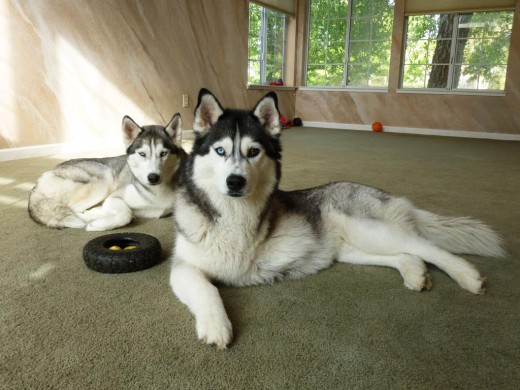
2. Siberian Huskies Make Awful Watch Dogs
Because Huskies look like wolves, many people assume that they are fierce dogs. Some people may even think that they are wolf hybrids.
However, a Sibe is more of a lover and less of a fighter.
When confronted with a stranger, my Husky will usually run up to him, give licks, and beg for food. As a result, Sibes do not make very good watch dogs. They will not only welcome everyone into your house, but will also give them the royal lick treatment.
If we want a dog that is only loyal to us and our family, then the Siberian Husky is not for us.
My Huskies are naturally happy and trusting dogs, who like to be with everyone. That is one of the things that I love most about them.
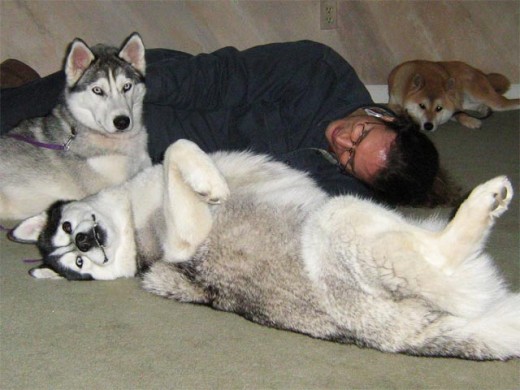
The Siberian Husky is not a watch dog, although those ignorant of his true nature may be frightened by his appearance. If you want a dog with aggressive guard-dog instincts . . . don’t buy a Siberian.
~~[SHCA]Leave your home in the care of a “guard” Siberian and he will most likely welcome an intruder with open arms, fetch (for the first time in his life) your valuables and show him the best route of escape–after all, Siberians are great escape artists.
~~[Siberian Rescue Site]
Note – This does not mean that Huskies will never be aggressive toward people. A dog’s behavior is determined both by genetics (breeding), as well as by training, socialization, context, and past experiences. A dog may become aggressive as a result of improper training, bad social experiences, insufficient socialization, and more.
For reasons of safety, it is important to ensure that our companion dogs are not people aggressive. Most companion dogs today guard us, by sounding an alert when unknown or strange people come close to our house. These dogs are not people aggressive. They do not bark, lunge, or growl at passers-by during walks. They are not aggressive toward guests and unknown visitors, who may need to work in or around our house. Their job is simply to alert us, when unusual events occur close to home. Anything more would quickly become dangerous and risky.
Highly trained guard dogs, such as those employed by law-enforcement, may be trained to attack or restrain an intruder. However, they are always under the control of their handler, are extremely well managed, and will only attack on-command or when they think their handler is in clear danger (as defined during training). They also do not bark or growl at pedestrians.
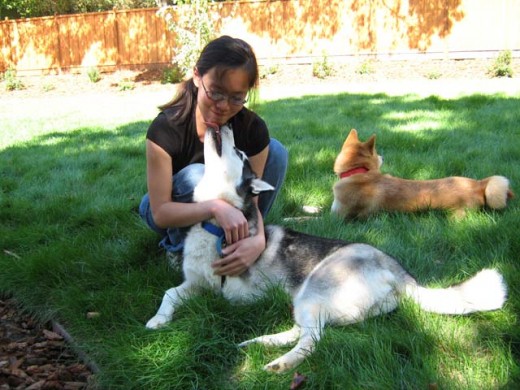
3. Siberian Huskies Have High Energy
They are intelligent, athletic, and were bred to pull sleds for extremely long distances, in the freezing cold. Therefore, be prepared to provide a Husky with a lot of mental and physical exercise.
A young Husky needs activity almost all day round. At around one-year old, my Sibe puppy sleeps for perhaps 3-4 hours during the day, and about 10 hours during the night. That leaves about 10 hours during the day where she is on the go.
She drains her energy most by playing with my other dog, a Shiba Inu. However, even my Shiba cannot fully keep up with her.


In addition to the playing, she works for all of her food, has long walks in the park several times a week, has structured dog play sessions, dog obedience training sessions, and still has energy left over to explore and dig in our backyard.
If bored, a Husky can become unhappy. He will likely escape, or use our house and belongings as chew toys. Unless our backyard is extremely secure, he can easily jump over or dig under a fence, in order to find adventure elsewhere.
If we are away at work for most of the day, then the Siberian Husky is probably not for us.
Siberians like having company and activity all day long. It is possible that a Husky can keep himself occupied if we have other dogs, but he may also lead our entire pack into mischief!
Sibes do best when there is frequent human supervision, throughout the day.
Siberians are a gregarious lot and need the company of other dogs or of people at all times.
~~[SHCA]The Husky needs lots of exercise and entertainment. They love to run and play, but must be allowed to do so safely.
~~[Hillside SPCA]

4. Siberian Huskies Are Independent Thinkers
They have a very independent mind and spirit, and will only perform, if we make it worth their while.
If we want an obedient dog that only lives to please us, then the Siberian Husky is not for us.
A Sibe is not a “yes sir, no sir“, kind of dog. To live well with him, we need to be fair, but firm. We need to consistently enforce our house rules, or he will take over the house.
The best way to train a Husky, is through the control of resources. Teach him that the best way to get what he wants, is to first do what we want. I use reward obedience training, and follow the Nothing in Life is Free program. Harsher techniques can make a Siberian distrustful, and ruin the natural free spirit of the breed.
Huskies are independent hunters. Their original breeders, the Chukchi of Northeastern Asia, would let their dogs free during the summer months to hunt for food on their own.
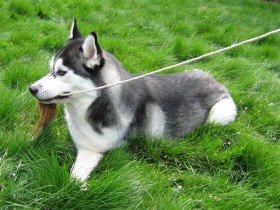
This has two very important consequences for living with a Husky today –
- A Siberian is not to be trusted with cats or other small animals. He can be trained to live with cats, but his instinct is to hunt them;
- A Siberian is not to be trusted off-leash. If he sees a small animal, he will likely bolt after it, and forget about cars, commands, and everything else. By the time he comes to his senses, he may be lost and far from home.
I have gotten a few comments about cats lately, so let me be clear …
Sibes can be trained to live with household cats. However, they usually have high prey drive, and will likely want to hunt and chase small animals, including squirrels, mice, and cats. Just because a Siberian gets along with our house cats, does not mean he will treat other neighborhood cats in the same way.
Huskies are bred to run and pull. This makes them more difficult to leash train than many other breeds. To train a Husky to walk on a leash, we need to have an immense amount of patience. Always be firm and consistent with the no-pulling rule, and reward good behavior.
If we do not have a large backyard, bring our Sibe to an enclosed park or soccer field, so that he can have some nice off-leash time to run, run, run.
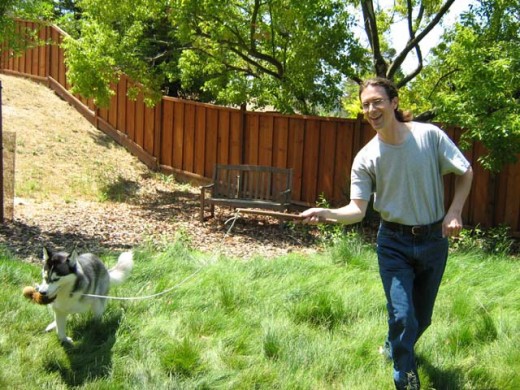
5. Siberian Huskies Are Not the Easiest Dogs to Potty Train
Certain dogs, like the Shiba Inu, are naturally clean and absolutely do not like soiling their living space. Because of their natural cleanliness, they are extremely easy to house train.
Sibes do not have that natural sense of cleanliness. In fact, they do not mind playing, and running around in their own waste products. Therefore, we must make it worth their while to potty outside.
Supervise our Husky puppy at all times, until he is fully house trained. Reward him well for pottying outside with high priority dog treats, play, and praise. If we are consistent with our puppy potty training, he will learn quickly, and be happy to go outside after a few weeks.
In addition, as Gigi points out, potty training difficulty is very dependent on what the dog or puppy is used to, in his previous environment. Puppy mill and pet store puppies are caged, most of the time. As a result, they will be harder to house train, because they are accustomed to going in their crates.

Where to Get a Siberian Husky Puppy
If we still want a Husky, then visit the Siberian Husky Club of America for a breeder list. Also consider adopting one from a local Husky rescue.
It really makes a BIG difference to get a puppy from an accredited breeder.
Please do not buy a puppy from online puppy sites or pet stores. Most of their puppies come from backyard breeders or puppy mills. Buying from them, will only help support and continue the dog cruelty of these unscrupulous puppy breeders.
If we are concerned about the initial cost of a puppy, consider that backyard breeders and puppy mills frequently produce unhealthy and unbalanced puppies. They will end up costing us a lot more, in terms of vet bills, dog training bills, and property destruction.
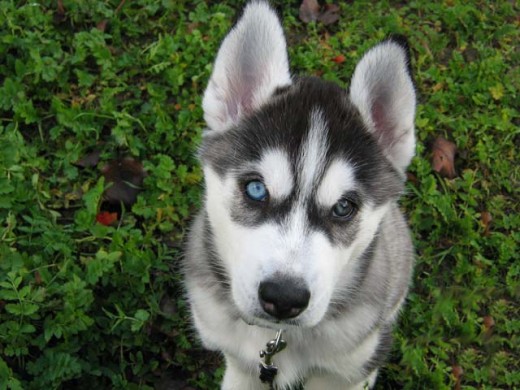
Siberian Huskies Are Wonderful Dogs

I love my Sibes. However, just because I think Huskies are wonderful dogs, does not mean that everyone else will think so as well; nor does it mean that they will fit into someone else’s lifestyle.
Clearly, each dog is an individual and will differ in terms of prey drive, energy level, obedience, and more. However, general breed characteristics and information from reputable sources, will give us a better idea of what to expect.
Often, there is conflicting information on the web. Therefore, one good place to start is with the AKC-recognized national breed club – The Siberian Husky Club of America.
Captivating in their beauty, grace and childlike demeanor, Siberians catch the eye of adults and children alike. They can be wonderful dogs for the well-informed or experienced Husky owner. However, they are NOT the breed for everyone and definitely not for first time dog owners. Too many wind up lost, in shelters, killed on the highway, abandoned or abused because the owner didn’t understand the breed and it’s challenging traits.
~~[Hillside SPCA]
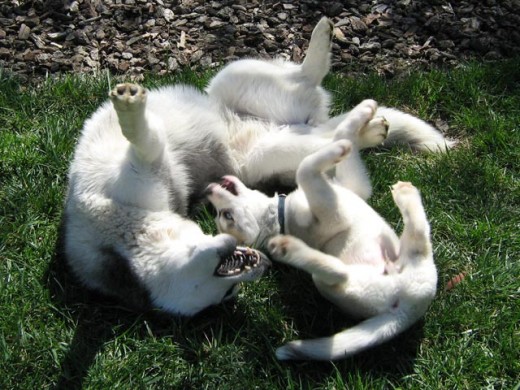
I own two siberian husky gaia father ( 4 years old ) and cookie daughter (2 and a half months old ) and they like my other dogs they don’t give me trouble but right Now I’m having with the father cuse I found a stray male husky his 8 years old I named him Oda oda and Gaia are fighting everytime I heard it’s to show who’s alpha but I also own a collie female named lazz and an Akita inu male named Liu but they don’t fight with them only each other what should I do
Are your dogs neutered and spayed? Dogs may show aggression for a variety of reasons, e.g. conflict over resources, fear aggression, etc. This ASPCA article has more on different types of aggression.
I keep my new dog separated until I am absolutely sure that he will get along with my other dogs.
I help my dogs get along by setting up clear dog-to-dog interaction rules. I supervise closely when there is a new dog to make sure that everyone is following my rules. As soon as I notice the *start* of any undesirable behavior, I redirect my dog before things escalate. In this way, my dogs know exactly what to expect from each other, what to expect from me, and what I expect from them in return. This creates certainty, and certainty helps to reduce stress and conflicts.
I want to set my dogs up for success by creating calm and rewarding together time. The more calm and rewarding together-time my dogs have, the more confidence, trust, and positive associations they form. Similarly, negative experiences will undermine that trust, set back my training, and worsen their future behavior. Therefore, I manage my dogs carefully and protect them from situations that they are not ready to handle, and where they will fail.
I set up a fixed routine and use management equipment such as leashes, gates, and more, as necessary, to make sure that everyone (dogs and people) are safe.
More on how I help my dogs get along.
However, dog behavior is very context dependent and you have many dogs, which makes things even more complicated. Given that the dogs are already fighting, it is best and safest to get help from a good professional trainer.
https://www.aspca.org/pet-care/virtual-pet-behaviorist/finding-professional-help
https://apdt.com/pet-owners/choosing-a-trainer/
hey
I rescued a stray husky female today. She is beautiful and seems to be very gentle. She has already been introduced to my Maltese, cat, and most importantly my son. She seemed to like them all. I have owned Judy about every type of dog there is but never a husky. Should I worry about her around my one year old?
I don’t have any children in the house. When we meet children in our travels, I always supervise closely and keep my dog on-leash. Children can get hurt accidentally even in play. I only let my dog meet children who are calm and who can follow my greeting instructions.
https://www.aspca.org/pet-care/virtual-pet-behaviorist/dog-behavior/preparing-your-dog-life-toddler
https://www.aspca.org/pet-care/virtual-pet-behaviorist/dog-behavior/teaching-your-dog-how-behave-around-children
https://www.aspca.org/parents/term/kids-and-pets
Husky is the 3rd safest breed to have around children but saying that huskys are still animals and no dog should be left unattended around a small child, my daughter is 5 and they love each other to bits but I still have to keep my eye on them both as being so young she don’t understand when Loki ( my husky) wants to be left alone.
Cute i am having one
Hi i asopted a 10 mnth old husky only to find out she has a liver shunt – she is now 2 do u no how much exercise she should have.
For something like this, I would consult with her vet and/or with a specialist.
I do not own a purebred Siberian Husky, nor a purebred anything! However, I DO own a 12 yr old mix which is includes Black lab, Shepherd and husky, and my reason for commenting is that I have always known she she, Nikki, is more husky in behavior than the other two, but after reading this entire article about a husky’s traits and behaviors, I am proud to report that indeed, my girl is more husky by far. In fact, there was not one thing mentioned that is not exact!! Now I know how to differ between what traits are personality and which are breed-specific. My Nikki was passed on to me from my daughter when she was 6 mo old and had been adopted from a shelter. My daughter is the one that should NOT have a husky breed, oddly enough, she and her husband do have two beautiful Sheba Enus! I knew basically nothing about the husky breed, but as fate had it, she and I became a match made in doggy heaven. She has been very difficult in some areas, and cause for some anxiety amongst others, and in other homes, but all in all, she has proven to be the perfect dog for me, my soul mate, if you will, and I have the same pride in her as a human parent does! I will think seriously about having another husky in the future. I love my Nikki!
Big hugs to Nikki! And yeah, Huskies are awesome! 😀
Give a big hug
I am thinking about adopting a one year male Husky. I read that they have high prey drive, cats, rabbits, etc. I also have a female Maltese. I wanted to know how do they act around smaller dogs?
How old is your Maltese? What is her temperament like? How does she react to larger dogs? Are you getting the Husky as a companion for your Maltese? What is the temperament of the male Husky? Have the two dogs met on neutral territory? What were their reactions?
During walks, my Huskies are fine with calm small dogs. However, they do not do well with vocal, over-excited small dogs that move around a lot. In addition, my Huskies love to wrestle and play rough. This makes play with a small dog risky and unfeasible.
Huskies can be trained and managed to live safely with cats and small dogs. However, size differences, prey drive, high energy, and love for rougher play, will mean that additional time will have to be put into proper supervision, management, and training.
Of course, each dog is different, with their own unique temperament and background, so it will also depend a lot on the temperament of both dogs, their environment, background, and surrounding context.
How I picked a second dog.
How I help my dogs get along.
We have a 5 month old male Siberian Husky, we also have a tea cup Chihuahua cross yorkshire terrier, they’re the best of friends. Our smaller dog warmed up to him after a week or two and now they play together most of the day.
I think it helps to have them from a pup though, he grew up with her, being taught to play more gently etc. but otherwise they’re great together. My smaller dog was a very anxious and nervous dog, didn’t like other animals, but our husky has brought her out of her shell and shes much braver now. He even grooms our smaller dog
We have a 6 month old husky and a 7 yr old pomeranian they get along very well but the husky has so mush energy all he wants to do is play with her but he knows when she’s on the couch or the bed it’s a no play area and he lets he b you just have to b firm with where they can play
My husband and I just rescued a 6 year old male husky. He is a sweet gentle soul. I have been training and raising dogs for years, and have worked with many “strong minded” breeds (rotties and Pitts mostly). Ice is my first husky. I have had no issue so far with him, he learns quickly, and seems very eager to please. He was kept on a logging chain for nearly 5 years, and now has my home and fenced yard. He gets along beautifully with my bully and Aussie, and is great with the kids. That k you for this article. It lets me know what to expect and how to approach his training, especially with him being an older boy. His personality is Awesome and I look forward to a life with this sweet boy.
Congratulations on your new furry family member! I am so glad that Ice has found a good and happy forever home! Big hugs to your fur-gang. 😀
Hey my husky is just 10 weeks old and we just got him last week but he likes to chew on everything and on my hands not to the point to where it hurts but I feel like if I don’t do something it will become a problem because his jaw will get stronger. Also I’ve noticed that he pees often and its usually right after he drinks water. Is this normal?
For puppy biting, I do-
1. Bite inhibition training.
2. No-bite conditioning.
3. Structure and puppy self-control.
More on how I deal with puppy biting.
Also, when I get a new puppy, I always take him to the vet for a check up and to get advice on a vaccination schedule. In this way, I make sure that my new puppy is healthy and continues to stay so.
I have a sibe and she’s like five months old .when we got her she was well behaved for a backyard breeder we got her when she was 2-3 weeks and now shes Really hyper but we expected that and now she’s kind of aggressive she tore open my brothers lip broke the skin when she bit me ony wrist peed on my bed and scratched my dad is her behavior just a phase or do we need to bring in a trainer ?, cause she loves to meet new people but when they pet her she snaps why doesn’t she.like people to pet the sides of her face ?,someone give me answers??
Given what you describe, I would definitely get help from a good professional trainer/behaviorist as soon as possible.
https://www.aspca.org/pet-care/virtual-pet-behaviorist/finding-professional-help
https://apdt.com/pet-owners/choosing-a-trainer/
In general, a puppy should not be separated from her mother or litter mates until she is at least 8 weeks old. This article explains why-
http://healthland.time.com/2011/08/25/the-risks-of-adopting-a-puppy-too-young/?hpt=hp_t2
I have a 17 Week old Husky named Spirit. He was super easy to potty train, I had him trained to sit, shake a paw and lay down within 2 weeks of having him. Hes has had nothing but great behavior, but i I have noticed a change in the last week or so. He has started with food/toy aggression with other animals and is now reacting terrible to dominance. He will growl or walk away from me when I try to give him trouble or commands. Is he just at his toddler stage or is this something I should be getting a trainer to help me with?
When I had similar problems with my Shiba during puppyhood, I got help from several professional trainers. With my dogs, I have found that it is best to deal with undesirable behaviors sooner rather than later, before it becomes a real issue.
https://www.aspca.org/pet-care/virtual-pet-behaviorist/finding-professional-help
https://apdt.com/pet-owners/choosing-a-trainer/
Both my Huskies are energetic, independent minded, and intelligent, so they need structure and I follow the Nothing in Life is Free program with all of my dogs.
More on how I trained my Husky puppy.
How I teach my dog self-control.
Why dogs guard food and toys.
ASPCA article on puppy socialization.
Dog dominance and bad dog behavior.